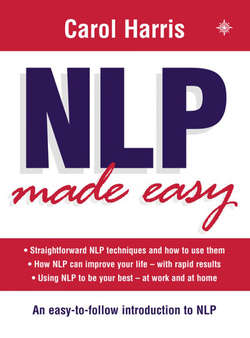Читать книгу NLP Made Easy - Carol Harris - Страница 51
NLP in the UK
ОглавлениеWhile NLP began life in the USA, the United Kingdom became a focal point for much activity and innovation, with two main strands to its development, involving Eileen Watkins Seymour and Graham Dawes. Together with Gene Early, Ian Cunningham and David Gaster, they made contacts which led to the foundation of the UK Training Centre for Neuro-Linguistic Programming (UKTC).
In Eileen Watkins Seymour’s account of how the field developed in Britain, she relates how in 1979 she was contacted by a fellow student on a humanistic psychology master’s programme in London and agreed to host a meeting with Gene Early and others who were interested in the subject.
Around a dozen people gathered and from this original meeting a study group was formed, which met on a fortnightly basis. Some of the people involved at that time were Michael Mallows, Willie Monteiro, Graham Dawes, Vivienne Gill, John Watson and Frank Kevlin, who later became Chair of the UK Association for Neuro-Linguistic Programming.
By the following year, members of the group became interested in starting some NLP training and Eileen, Gene Early, Graham Dawes, David Gaster and Ian Cunningham initiated the first Diploma programme in the UK, at the London Business School, and the UK Training Centre (UKTC) was born. The Diploma programme lasted eight months, with a focus on quality in both the training and the elements surrounding it. At the time it was the only full-scale NLP training anywhere outside North America.
The aim of the UKTC was to grow people, not to make money, and the whole ethos of the organization reflected this. Sessions ran from Friday evening through the entire weekend. The first group consisted of 30 people, many of them therapists, and as well as the weekend training, everyone went to a weekly study group. Early trainers on the programme included Gene Early, Barbara Witney, David Gaster, David Gordon and Robert Dilts. Charlotte Bretto and Dave Dobson were also early trainers. Later, master’s programmes were offered, as well as speciality workshops given by visiting trainers from overseas.
By 1987, David Gaster had moved on and Gene Early and Graham Dawes felt it time to hand over the reins. Dudley and Regan Masters, trainers who had graduated from the UKTC, were given the Centre. Eileen was still keen to continue, but decided to ‘let go of [her] baby’. The UKTC only lasted for two further years and was then wound up. Dudley and Regan Masters have not been seen on the NLP scene since and word has it that they became born-again Christians. David Gaster, sadly, died a few years ago. Eileen, in conjunction with Clive Digby-Jones (now her husband), founded and still runs the Ravenscroft Centre in London. Graham Dawes continues his activities in NLP, as does Gene Early. Both are respected figures in their communities.
Several early graduates of the UKTC subsequently set up their own training centres in the UK. Some of the earliest ones were PACE, John Seymour Associates, NLP Training Program, Pace Personal Development and Sensory Systems, as well as associated bodies such as British Hypnosis Research and the Proudfoot School of Hypnosis.
Currently there are over 50 UK training organizations and although it is increasingly difficult to pinpoint individuals or individual organizations as ‘leading edge’, there are many innovative steps being taken which contribute to the development, and professionalism, of NLP in the UK.
In addition to the training organizations, numerous networking and practice groups have sprung up throughout the UK and these provide an opportunity for people at all levels of experience to meet, exchange ideas and work on their own personal and professional development. The most prominent of these started life as the Paddington Group, meeting near Paddington station in central London in the 1990s. This group introduced a wide range of people to NLP and acted as a forum for prominent practitioners from the UK and outside.
